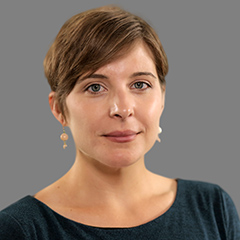Kansas City, Missouri, boasts an unemployment rate that is lower than both the state and national average, but too many still have difficulty finding a job. The problem is particularly acute for working-age adults who lack a bachelor's degree. Focused, employer-driven job training programs can help, but Kansas City residents face obstacles to participating in these programs. Whether it’s childcare responsibilities, access to stable housing, or concerns about when they might have their next meal, these barriers make it hard to enroll in and find the time to complete training programs.
Great Jobs KC, with $50 million in support from the Kauffman Foundation, aims to bridge this gap by providing free, flexible job training in in-demand industries paired with comprehensive wraparound services such as transportation, laptops, and personalized mentorship through Scholar Advocates. Mathematica’s early evaluation suggests the program is transformative, with high completion rates and significant earnings increases for participants. By enrolling 7,000 jobseekers within two years—surpassing its initial goal and other regional programs—Great Jobs KC demonstrates how strategic funding and tailored support can create opportunities and serve as a national workforce development model.
The Great Jobs KC Model: Free Training and Personalized Support
Great Jobs KC launched in 2022 with a five-year mission to provide short-term, flexible, skills-based training for up to 5,000 jobseekers aged 17 and over each year. Covering a wide range of in-demand industries including construction, healthcare, IT, logistics, service careers, and manufacturing, the local workforce development program marries specialized training with personalized services. By funding and offering support to participants, such as access to public transportation to get to classes, free laptops and internet access that allow them to build on classroom learning, or a stable place to call home, Great Jobs KC helps each participant overcome the unique obstacles they face to successfully train and look for well-paying jobs in the region.
What sets Great Jobs KC apart is not just its comprehensive wraparound services, but its proactive approach to securing funding and evaluating its impact. The program invited Mathematica to take an early look at whether the program was meeting its ambitious mission and understand more about the people participating in it, called Scholars. This early evaluation allowed the program to assess its impact on participants' lives as they enrolled and participated in training. The study examined how many Scholars finished the program and found jobs, and most important, provided early evidence that this combination of training and support can lead to higher wages.
The study also compared the Great Jobs KC model to other workforce programs in the region and found that several aspects of this approach improve on what has been tried before. Perhaps most important is its funding for a robust support system, which includes giving Scholars personal support from a Scholar Advocate. These one-on-one mentors were critical in helping Scholars navigate through training, the job search process, and their first year of employment by accessing the support services they needed along the way.
In just two years, Great Jobs KC processed 53,000 applications and enrolled more than 7,000 Scholars, where other vocational programs in the region typically enrolled fewer than 500 trainees each year. The early success of Great Jobs KC suggests that these programs—when adequately funded—can successfully serve more people than is typically the case. The program may serve as a model for other cities to follow, setting more ambitious goals for pursuing funding and developing partnerships with training providers and community service organizations to strengthen the workforce development ecosystem.
Early Signs Show a Dramatic Improvement in Earnings
Mathematica’s initial program evaluation found promising early outcomes.
- A strong majority (83 percent) of Scholars stayed enrolled in the program long enough to complete their training, with 56 percent completing “on time” and 27 percent still working toward completion.
- 6 out of 10 Scholars who completed their training found a job within 6 months.
- Scholars who found jobs dramatically increased their earnings, with an average salary increase of 165 percent [from $17,333 to $46,089 annually].
- If Scholars continue to see these earning gains in the context of a full impact study, Great Jobs KC would be among the most impactful workforce training programs in the U.S.
Importantly, these results have the potential to improve over time. When the evaluation concluded in 2024, the program was still working to place an even higher percentage of graduates into jobs by coordinating with an expanded set of regional employers and delivering more intensive job-search supports to Scholars who need them. If those efforts succeed, even more Scholars who complete training could attain this large boost in income.
Great Jobs KC could provide an innovative model for other workforce training programs seeking to support adults without a college degree. These promising early findings show that investments in retraining and job skills can pay off at any phase of life, especially when training is paired with support for and funding of the wraparound services that are needed to help participants overcome their individual and wide-ranging obstacles. Initiatives like these can offer a promising and more economically secure future for many individuals seeking to improve their lives through specialized career training.
Are you looking to measure and improve the impacts of your workforce training program on earnings and job placement? Contact us to discuss your needs with Mathematica’s Education and Employment Department.





